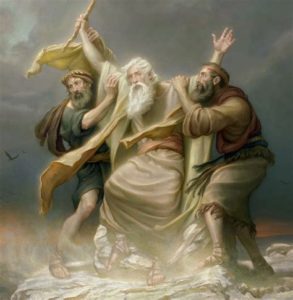“And let us not grow weary while doing good, for in due season we shall reap if we do not lose heart.” Galatians 6:9
 It is easy to get tired when we fight a prolonged battle of any kind. Whether we are trying to lose weight, break a habit, change an attitude or battle against someone battling against us, it can be a long and tedious road. Sometimes the battle fatigue gets so heavy that we start to lose heart. We look at the mountain ahead of us instead of the the next step. We fixate on the enormity of the task and get the overwhelming desire to just put the work aside and give up. As we know, however, if we stop doing something, it is twice as hard to get going again and sometimes, unfortunately, we never do.
It is easy to get tired when we fight a prolonged battle of any kind. Whether we are trying to lose weight, break a habit, change an attitude or battle against someone battling against us, it can be a long and tedious road. Sometimes the battle fatigue gets so heavy that we start to lose heart. We look at the mountain ahead of us instead of the the next step. We fixate on the enormity of the task and get the overwhelming desire to just put the work aside and give up. As we know, however, if we stop doing something, it is twice as hard to get going again and sometimes, unfortunately, we never do.
Chapter 17 of Exodus records the battle between the Israelites and the Amalekites. The Amalekites were descendants of Esau, so this was sort of a family feud. Amalek was the leader of the Amalekites, and in Deuteronomy 25 we learn that they took advantage of the exodus from Egypt by picking off the old, sick, and weary that lagged behind the group. It was much like the predators in Africa which follow herds and wait for one to get separated from the larger group and then attack. “Remember what the Amalekites did to you on the journey after you left Egypt. They met you along the way and attacked all your stragglers from behind when you were tired and weary.”
It was much like the predators in Africa which follow herds and wait for one to get separated from the larger group and then attack. “Remember what the Amalekites did to you on the journey after you left Egypt. They met you along the way and attacked all your stragglers from behind when you were tired and weary.”
Now they were once again in a battle with those same people and Moses was reminded of their dirty tricks from the past. Moses told young Joshua to choose a fighting force and that Moses would stand atop a hill with the rod of God in his hand. Moses would raise the rod of God and as long as his arms were raised, Joshua would have the upper hand in the battle.
Joshua and his men fought hard, but as Moses began to become fatigued and started to lower his arms, the tide of battle would turn in favor of the Amalekites. Finally, when it looked like Moses could not hold on any longer, his brother Aaron and a man named Hur raced to help him. Exodus 17:12 records what they did,  “When Moses’ hands grew heavy, they took a stone and put it under him, and he sat down on it. Then Aaron and Hur supported his hands, one on one side and one on the other so that his hands remained steady until the sun went down.”
“When Moses’ hands grew heavy, they took a stone and put it under him, and he sat down on it. Then Aaron and Hur supported his hands, one on one side and one on the other so that his hands remained steady until the sun went down.”
Moses knew he had a job to do and others depended on him doing it. But regardless of how important it was, there was a limit to his physical strength. We are not God. We are not all powerful. We will reach our limits in our battles. We can learn much from Moses, Aaron, and Hur in these verses and the lesson of these verses is two-fold.
First, the rod that Moses raised to heaven was his reliance on God’s strength while engaged in battle. It was like the prayers we raise in difficult times. As fatiguing as it may be, we must continue to go to Him and to raise our prayers to heaven. It is often easy, especially in trying times, to neglect going to Him for our strength. When we are fighting evil, we must remember that God, too, is engaged in our battle. We are not asked to fight the battle alone. Moses was in the battle, but so was Joshua and hundreds of others. When we are in a battle we can enlist others to help us as well. God expects that. He will bring those people into our lives that can help us to fight and to remain strong.
Secondly, we need others to strengthen us in moments of weakness  and we need to strengthen others when they face difficulties in their own battles. When Aaron and Hur supported Moses, it was as though they were coming alongside him in prayer. They supported him when weakness ravaged his body. They did not replace God, but helped Moses to remain strong in God.
and we need to strengthen others when they face difficulties in their own battles. When Aaron and Hur supported Moses, it was as though they were coming alongside him in prayer. They supported him when weakness ravaged his body. They did not replace God, but helped Moses to remain strong in God.
Our support of others should always point them to who God is and what he can do. Our battles might be small like better eating habits or large like handling the loss of a loved one, but regardless, the rod of God needs to remain pointed upward so that God can be engaged in the battle, as well.
First Timothy 2:8 says, “I desire therefore that the men pray everywhere, lifting up holy hands, without wrath and doubting.” Keeping our eyes on Jesus and our hearts raised to him is the only way we can fight the battles before us. Remember what John said in his gospel, “I have said it before, and I will continue to remind you as my brothers and sisters – we cannot do anything apart from God.” (John 15:5). We should be quick to support others in prayer and not be afraid to have others join us in prayer. All of us are in battles and we need each other for support. God did not reprimand Moses for his fatigue, but answered his prayers and the support of Aaron and Hur with a victory over the Amakekites.
Prayer is our link to victory. Joshua defeated the Amalekites with the sword, but we too have sword to take into battle with us. Our sword is the word of God. Ephesians 6:17 says, “Take the helmet of salvation, and the  sword of the Spirit, which is God’s word.” It is the only offensive weapon we have. All of the others are defensive. So it is important that we know how to wield the Word as God would want us to and we will only know that through prayer.
sword of the Spirit, which is God’s word.” It is the only offensive weapon we have. All of the others are defensive. So it is important that we know how to wield the Word as God would want us to and we will only know that through prayer.
In James we learn that we should “confess your sins (weaknesses) to one another and pray for one another, so that you may be healed (strengthened). The urgent request of a righteous person is very powerful in its effect. (James 5:16)
A man had a dream about going to Hell where he went into huge banquet room that was filled with food and people, yet all were starving because their arms were splinted and they could not get the food to their mouths. Then he dreamed he saw the same banquet room in heaven yet everyone was enjoying the food. They were feeding each other. We all need help and we can all give help. With each other’s help “(we) will soar on wings like eagles; (we) will run and not grow weary; (we) will walk and not faint.”